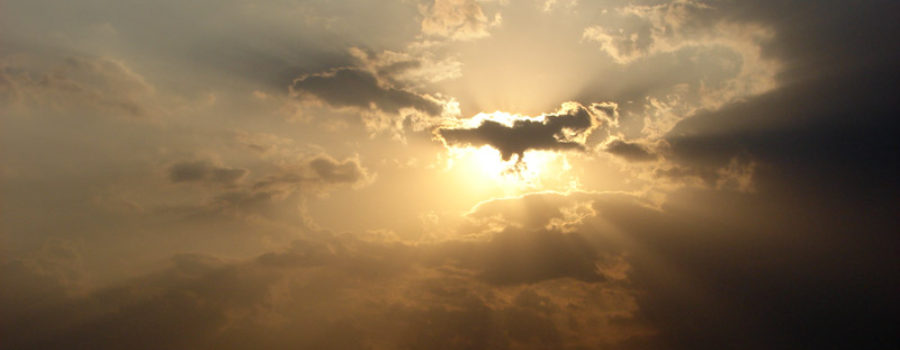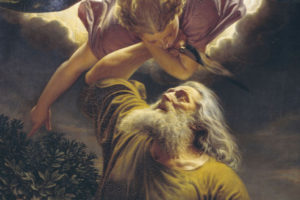As we go through the Scripture we observe what can be called ‘a hierarchy of blessings’. It begins with all of us humans. We, of all created beings, have received the privilege to have been created in the image of God. All of us share this benefit, yet few comprehend the width of its entailment and the responsibilities it presupposes.
The Jewish People
From this general blessing emanates another one quite particular in nature. Among all the peoples who were on the face of the earth, the Jews became God’s chosen people:
For you are a holy people to the LORD your God, and the LORD has chosen you to be a people for His own possession out of all the peoples who are on the face of the earth” (Deuteronomy 14:2).
These words conceal in their bosom advantages and peculiar privileges, for as Paul writes: “What advantage then has the Jew, or what is the profit of circumcision? Much in every way! Chiefly because to them were committed the oracles of God” (Romans 3:1,2). God Himself refers to the Jews as the apple of His eye (Zechariah 2:8); and Jesus reminds us that: “Salvation is of the Jews” (John 4:22).
The Levites
Then, among all the Israelites the tribe of Levi was chosen to serve in the tabernacle. They were thus separated from all the other Jews and brought specially near to God to minister to His people: “Is it a small thing to you that the God of Israel has separated you from the congregation of Israel, to bring you near to Himself, to do the work of the tabernacle of the Lord, and to stand before the congregation to serve them” (Numbers 16:9). Without a doubt this blessing exalted a specific group of people and elevated them to a place of unprecedented privileges.
The priests
Then we have the descendants of Aaron. From all the Levites they only were chosen as priests. Only them could enter the Holy Place and therein minister to God Himself. The rest of the Levites were ordered to assist them under strict regulations:
Bring your fellow Levites from your ancestral tribe to join you and assist you when you and your sons minister before the tent of the covenant law. They are to be responsible to you and are to perform all the duties of the tent, but they must not go near the furnishings of the sanctuary or the altar. Otherwise both they and you will die” (Numbers 18:2,3).
Another thing making the priests unique was their anointing. All of them were anointed with the holy anointing oil, the oil that was used to sanctify the tabernacle and its articles, including the ark of the Testimony. Everyone and everything anointed with the shemen ha-mishchah was qodesh, i.e., most holy (Exodus 30:29).
Without a doubt the priesthood was an amazing gift: “Therefore thou and thy sons with thee shall keep your priest’s office for every thing of the altar, and within the veil; and ye shall serve: I have given your priest’s office unto you as a service of gift: and the stranger that cometh nigh shall be put to death” (Number 18:17). By stranger God referred to anyone who was not qodesh.
The story of Korah reveals how the Levites who were not descendents of Aaron had fewer privileges than the priests. It was precisely this difference that triggered envy in Korah and other Levites. Moses had to remind them how wrong it was to despise their own office and lust after the priesthood (Numbers 16:8–10).
As we can see, God’s blessing was becoming more and more selective as it grew in intensity, giving rise to greater privileges and responsibilities.
The high priest
Ultimately, the crown of all blessings was set on the head of a single person, the high priest. Among all the priests he was the most privileged of all. Him only was permitted to enter in the Most Holy Place, that is, behind the second veil. Only him could see the Shekhinah of God—the manifestation of the dwelling Presence and His glory.
What about us?
Where do we Christian gentiles fit in all this? As we have seen, we have been created in God’s image. This blessing entails we can communicate with God. But in contrast with all humans we, on the fashion of Israel and through them, have become part of the people of God. As the apostle Paul points out:
Therefore remember that you, once Gentiles in the flesh—who are called Uncircumcision by what is called the Circumcision made in the flesh by hands—that at that time you were without Christ, being aliens from the commonwealth of Israel and strangers from the covenants of promise, having no hope and without God in the world. But now in Christ Jesus you who once were far off have been brought near by the blood of Christ” (Ephesians 2:11–13).
What a legacy Christ left us. He broke down the middle wall of partition and united us with Israel (Ephesians 2:14).
Now this would be enough to be grateful for an eternity, but it is not all. God’s generosity towards us has known no limits. The Scriptures declare that we have been made priests to God. Not merely Levites but priests. Yes brethren! Priests!
If only we could grasp the riches of the blessing. As Thomas Traherne noticed centuries ago: “We wretches are indifferent!” Too often these words nearly fit us to perfection. And there comes the exhortation:“ ’Tis death, my soul, to be indifferent; set forth thyself unto thy whole extent, and all the glory of His passion prize, Who for thee lives, Who for thee dies.”
So we have been made priests. On us the Holy Anointing Oil has come. We, as the descendents of Aaron, have been made qodesh. Hence we can minister to God acceptably (Hebrews 12:28). But again that’s not all. God’s blessing for us has extended behind the second veil: “Therefore, brethren, having boldness to enter the Holiest by the blood of Jesus, by a new and living way which He consecrated for us, through the veil, that is, His flesh, and having a High Priest over the house of God, let us draw near with a true heart in full assurance of faith, having our hearts sprinkled from an evil conscience and our bodies washed with pure water” (Hebrews 10:19–22).
Although we are not high priests, the second veil has been torn down and we can contemplate, as in a mirror, God’s glory (2 Corinthians 2:18). Thus have we been exalted. All this should leave us aghast, in utter reverence and adoration.
But there is more
Not only we have been made priests of God, but also kings. Peter writes:
But you are a chosen generation, a royal priesthood, a holy nation, His own special people, that you may proclaim the praises of Him who called you out of darkness into His marvelous light; 10 who once were not a people but are now the people of God, who had not obtained mercy but now have obtained mercy” (1 Peter 2:9,10).
Peter attests that we are a royal priesthood. Conceding these words could mean we are the priests of a King, the book of Revelation leaves no room for such an interpretation: “And [Christ] hath made us kings and priests unto God and his Father; to him be glory and dominion for ever and ever. Amen” (Revelation 1:6). And again: “And hast made us unto our God kings and priests: and we shall reign on the earth” (Revelation 5:10). So there is a throne awaiting the one who will overcome: “To him that overcome will I grant to sit with me in my throne, even as I also overcame, and am set down with my Father in his throne”(Revelation 3:21).
In the Old Testament only Melchizedek is reported to have been both priest and king (Genesis 14:18). Likewise Jesus, who received His priesthood according to the order of Melchizedek (Hebrews 6:20), is also both Priest and King. Actually He is not only priest, He is our eternal High Priest.
To understand the greatness of our privilege we must realize that only Melchizedek and Jesus have had what we have received by grace. Only them have held the office of priest and king. And us, through Jesus and like Him, we have received our priesthood according to the order of Melchizedek. Such exaltation is nearly unconceivable.
We sinners of the gentiles have been rescued, washed, dressed, and elevated to a place of glory. As the Scripture declares:
He raises the poor out of the dust, and lifts the needy out of the dunghill, that He may seat him with princes—with the princes of His people” (Psalm 113:7,8).
We, of all people, should overflow with gratefulness. Our songs should reverberate upon the walls of the cities and through the meadows. And above all, our lives should honor the One Who has so promoted and dignified us.
I leave you with Traherne’s godly exhortation:“ ’Tis death, my soul, to be indifferent; set forth thyself unto thy whole extent, and all the glory of His passion prize, Who for thee lives, Who for thee dies” (Thomas Traherne – 1636 or 1637 – 1674).
If you think this post can help somebody else you can share it with the options presented bellow.













